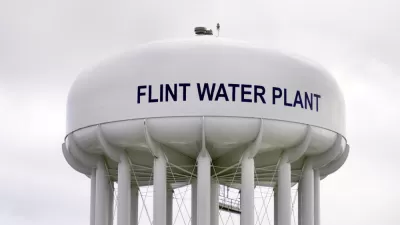The end of the U.S. Environmental Protection Agency may not come from the hands of President Trump or Scott Pruitt, the nominee to head the agency, but from a bill introduced Feb. 3 titled, "To terminate the Environmental Protection Agency."

Is it more likely that the Republican Congress will support a revenue neutral carbon tax to fight climate change, proposed by a "group of Republican elder statesmen," including former Secretary of States James A. Baker III and George P. Shultz, or a proposal by Florida Republican Rep. Matt Gaetz that would eliminate the federal government's premier agency dedicated to protecting human health and the environment?
The latter clearly has a head start as it's already a bill, H.R.861, and has attracted three other Republican co-sponsors: Rep. Thomas Massie of Kentucky, Rep. Steven Palazzo of Mississippi, Rep. Barry Loudermilk of Georgia.
FOX Business host Stuart Varney suggests to Gaetz on the FOX Business video that his legislation is more of a "declaration of intent, of direction in which you wish to go."
"It's hostility toward what the federal government has done to us all in terms of the environment. That's really what you're doing because you don't really expect to abolish the EPA, do you?" he asks.
But Gaetz doesn't agree. After recognizing that there are federal environmental laws that will need to be enforced, he states,
[M]y belief is the EPA in its current form can not be reformed...so we've got to go a lot bolder than just reforming around the edge. We ought to start over with right-sized regulations that will protect our environment...We ought to 'downstream' the $8 billion that the EPA currently spends to our states and local governments where we can truly protect the environmental assets important to our states and local communities.
Gaetz's position isn't that different from some of his Republican colleagues who have proposed downsizing the U.S. Department of Transportation through the policy of devolution: drastically reducing or eliminating the 18.4 cents federal gas tax and relegate U.S. DOT's financial responsibility to states.
Co-sponsor Rep. Loudermilk of Georgia points to an example of what he calls the EPA's "overreach" in his press release. Others would call it a terrible accident, to be charitable, or at worst an act of negligence:
“You don't have to look far to find examples of the EPA's bureaucratic overreach being counter-productive to good environmental protection. As recently as 2015, the EPA ignored an environmental contractor’s objection to excavating the Gold King Mine in Colorado, warning of a potential blowout. The excavation ended up causing a blowout that contaminated waterways in three states with toxic levels of arsenic and mercury.
Another incident where the EPA took hits from Congress and the public was with the 2014 lead poisoning of the drinking water in Flint, Michigan, illustrated by the $722.4 million lawsuit filed last month against the EPA by 1,700 residents for mishandling the crisis.
A prescient March 2016 Planetizen post on the role of the EPA in Flint's water crisis states, "Expect EPA to be radically downsized and stripped of much of its authority should a Republican become the next president."
However, supporters of H.R. 861 should consider that while the EPA could have acted more expeditiously, the real culpability, according to "an independent investigative group whose five members were appointed by Republican Michigan Governor Rick Snyder," lay with two state agencies and the state-appointed emergency managers of Flint..
For a progressive perspective on Gaetz's legislation, Dahr Jamail of Truthout writes, "This is a sign of how a majority-Republican House of Representatives now emboldened by a fiercely anti-environmental Donald Trump presidency is acting rapidly to dismantle as much environmental regulation as possible."
Hat tip to Loren Spiekerman.
FULL STORY: Republican Congressman on Push to Abolish the EPA

Planetizen Federal Action Tracker
A weekly monitor of how Trump’s orders and actions are impacting planners and planning in America.

Congressman Proposes Bill to Rename DC Metro “Trump Train”
The Make Autorail Great Again Act would withhold federal funding to the system until the Washington Metropolitan Area Transit Authority (WMATA), rebrands as the Washington Metropolitan Authority for Greater Access (WMAGA).

DARTSpace Platform Streamlines Dallas TOD Application Process
The Dallas transit agency hopes a shorter permitting timeline will boost transit-oriented development around rail stations.

Renters Now Outnumber Homeowners in Over 200 US Suburbs
High housing costs in city centers and the new-found flexibility offered by remote work are pushing more renters to suburban areas.

The Tiny, Adorable $7,000 Car Turning Japan Onto EVs
The single seat Mibot charges from a regular plug as quickly as an iPad, and is about half the price of an average EV.

Supreme Court Ruling in Pipeline Case Guts Federal Environmental Law
The decision limits the scope of a federal law that mandates extensive environmental impact reviews of energy, infrastructure, and transportation projects.
Urban Design for Planners 1: Software Tools
This six-course series explores essential urban design concepts using open source software and equips planners with the tools they need to participate fully in the urban design process.
Planning for Universal Design
Learn the tools for implementing Universal Design in planning regulations.
Municipality of Princeton
Roanoke Valley-Alleghany Regional Commission
City of Mt Shasta
City of Camden Redevelopment Agency
City of Astoria
Transportation Research & Education Center (TREC) at Portland State University
US High Speed Rail Association
City of Camden Redevelopment Agency
Municipality of Princeton (NJ)




























